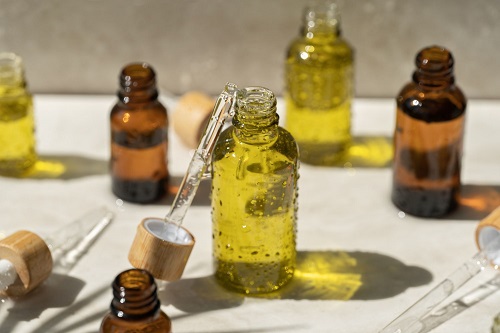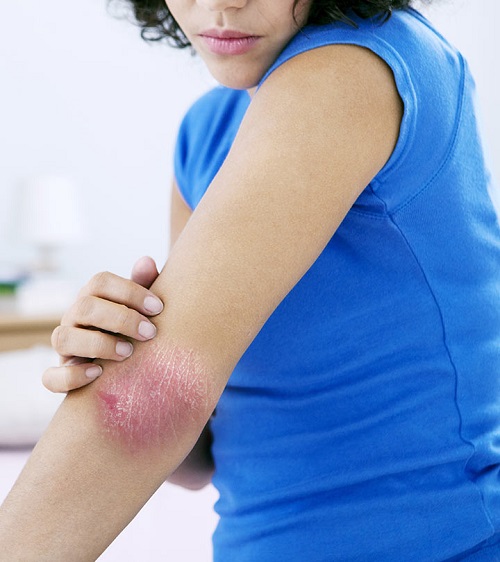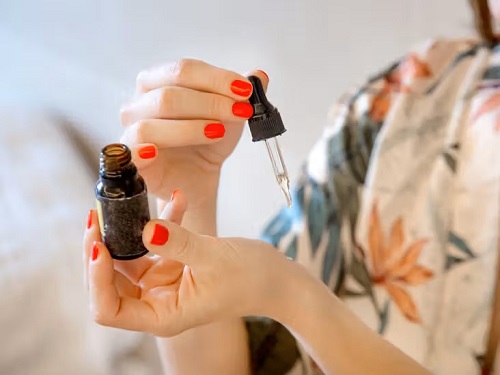Can Castor Oil Help Psoriasis? Learn how its therapeutic composition can treat this uncomfortable skin condition!

If you’re grappling with psoriasis, you’ve probably tried multiple remedies to relieve its symptoms. One natural treatment that’s gaining attention is castor oil. But Can Castor Oil Help Psoriasis? Below, we delve into the science and practical application of using Castor Oil for Psoriasis treatment.
Learn about Using Castor Oil for Eczema here
What Is Psoriasis?
Psoriasis is a chronic skin disorder characterized by rapid skin cell growth, leading to the formation of thick, red, scaly patches on the skin’s surface.
It can cause itching, discomfort, and emotional distress. While there is no cure, there are effective treatments available to manage the symptoms and improve the quality of life for individuals living with psoriasis.
In this condition, the immune system mistakenly targets healthy skin cells, causing them to multiply at an accelerated rate. As a result, these excessive skin cells accumulate on the surface, forming raised, itchy, and often painful plaques.
The different types of Psoriasis include:
- Plaque psoriasis is the most common form of psoriasis. Symptoms include pain and itching associated with the raised red plaques; sometimes, the plaques can crack or bleed. In severe cases of plaque psoriasis, the irritated skin can grow and merge together, causing the plaques to cover large areas of irritated skin. Other symptoms include disorders of the fingernails and toenails, such as discoloration, as well as scaly plaques on the scalp.
- Pustular psoriasis, another type of psoriasis characterized by tiny pustules, occurs on the palms of the hands and/or the feet.
- Inverse psoriasis occurs in skin folds such as the armpits or under the breasts and appears in the form of red, shiny lesions.
- Guttate psoriasis occurs on the torso and limbs in the form of small, red spots, and may be triggered by respiratory infections as well as stress, skin injury, strep throat and tonsillitis, and anti-malarial/beta-blocker medications.
- Lastly, erythrodermic psoriasis presents as sheets of shedding scales as well as bright redness of the inflamed area, and can be triggered by withdrawal from treatment, sunburn, infection, and certain medications, and requires urgent medical treatment.
- Psoriasis is also linked to the joint condition of psoriatic arthritis. It is estimated that 10-30% of psoriasis sufferers also show signs of the pain and swelling associated with psoriatic arthritis.
Discuss the Best Castor Oil Types here
How Can Castor Oil Help Psoriasis?
Psoriasis is incurable, and Castor oil can only help treat its symptoms.
It can be a distressing condition, causing both physical discomfort and emotional stress. If you’re among those seeking alternative treatments for easing the condition, castor oil may be a viable option. Below, we break down the Castor Oil Benefits of Psoriasis:
1. Anti-Inflammatory Properties
One of the primary benefits of castor oil for psoriasis stems from its anti-inflammatory capabilities. The ricinoleic acid present in castor oil targets inflammation, helping to reduce the redness and puffiness associated with psoriasis flare-ups.
2. Moisturizing Effect
Dry, flaky skin is a common issue for those suffering from psoriasis. Castor oil serves as a natural moisturizer, restoring hydration to the skin. When you apply it to the affected areas, you’ll notice an immediate difference in skin texture and softness.
3. Scalp Relief
If you’re wondering specifically about castor oil for scalp psoriasis, here’s the good news—It works wonders on the scalp as well. When massaged into the scalp, castor oil can help alleviate itching and flakiness, making it easier to manage your daily activities without the constant urge to scratch your head.
4. Enhanced Blood Circulation
Castor oil encourages better blood circulation when applied topically. Improved circulation can aid in the healing process of psoriatic patches, promoting healthier skin over time.
5. May Reduce Scarring
Though research is limited, anecdotal evidence suggests that castor oil may help reduce the appearance of scars related to psoriasis. The fatty acids in castor oil help regenerate skin tissue, potentially minimizing scarring.
Learn about Diluting Castor Oil here
How to Use Castor Oil for Psoriasis?
The benefits of castor oil for psoriasis are increasingly recognized, but knowing how to use it effectively is crucial for optimal results. Below, we outline the methods for using castor oil for psoriasis treatment, focusing on direct application, soaks, and compresses:
1. Direct Application Method
- Clean the affected area with mild soap and water. Pat dry gently.
- Take a small amount of pure castor oil on your fingertips.
- Apply the castor oil directly onto the psoriatic patches, massaging in circular motions for better absorption.
- Allow the oil to sit for at least 20-30 minutes for optimal results.
- Wash off with lukewarm water.
Benefits:
The direct application method is most effective for localized patches and is easy to include in your daily skincare regimen. The fatty acids in castor oil can provide immediate relief from dryness and irritation, making this method highly beneficial for psoriasis-affected skin.
2. Castor Oil Soak Method
- Fill a basin with warm water.
- Add 2-3 tablespoons of castor oil to the water and mix well.
- Immerse the afflicted area in the castor oil-infused water for about 20 minutes.
- Remove the limb from the soak, rinse with lukewarm water, and pat dry.
Benefits:
The castor oil soak method works well for psoriasis affecting larger areas or hard-to-reach places. The warm water helps to open pores, allowing for better absorption of castor oil and its anti-inflammatory properties.
3. Castor Oil Compress Method
- Prepare a clean cloth and a sheet of plastic wrap.
- Soak the cloth in pure castor oil.
- Place the soaked cloth over the psoriatic patches.
- Cover the cloth with plastic wrap to keep it in place.
- Let it sit for about 30-60 minutes.
- Unwrap and discard the plastic wrap, then gently remove the cloth.
- Wash the area with lukewarm water.
Benefits:
A castor oil compress is useful for more severe or stubborn psoriasis patches. The prolonged exposure to castor oil allows for deep penetration, making this method particularly effective for those looking for intensive treatment.
Discuss the Castor Oil Pack Detox Symptoms here
Precautions To Consider
- Always extensively perform a patch test before using castor oil to check for any adverse reactions or allergies.
- If you experience any adverse reactions or worsening symptoms, discontinue use immediately.
- Consult with a dermatologist or healthcare provider before using castor oil for psoriasis, especially if you use other prescribed psoriasis treatments.
- Pregnant and breastfeeding women must always avoid using castor oil.
Discover the Side Effects of Castor Oil here
The Bottom Line: Castor Oil and Psoriasis
Psoriasis is not curable, but flare-ups are manageable. Especially with the benefits of natural castor oil, in addition to medication and therapies. Castor oil is effective at soothing and relieving itchy, painful plaques.
Ricinoleic acid and its antibacterial and antifungal properties help to cleanse and moisturize the affected patches of skin. Castor oil can also effectively soothing sore joints associated with psoriatic arthritis.
Castor oil deserves a place in the holistic treatment of psoriasis flares. Couple it with other medications and therapies for the best results!



